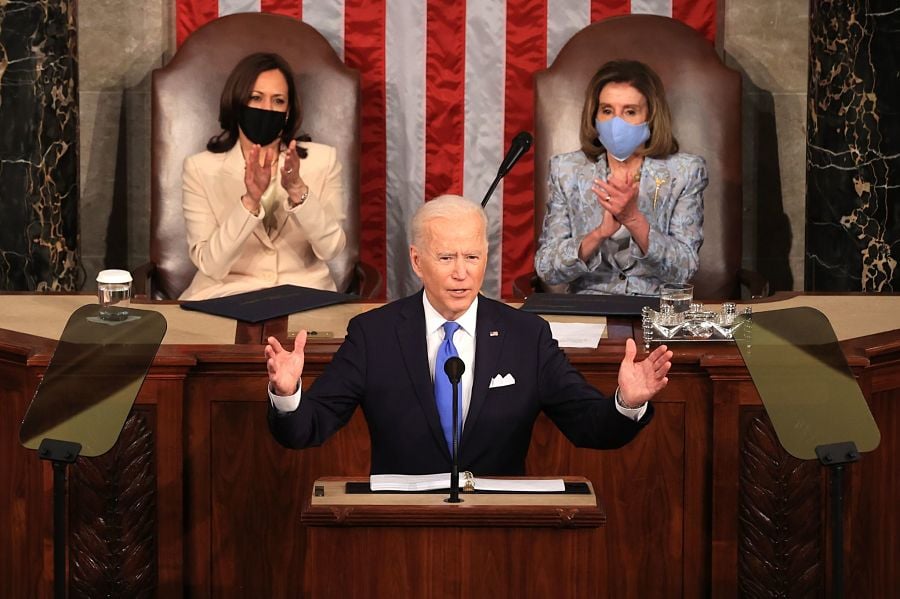

President Biden is likely to succeed in raising taxes on the wealthy -- but not as much as he is proposing, experts said.
Biden introduced Wednesday night the American Families Plan, a $1.8 trillion package of spending to expand education, childcare, nutrition and other programs and establish national paid family and medical leave.
He would pay for his ambitious social policy reform by raising taxes on high-income earners. His proposals include boosting the highest individual rate to 39.6% for people making more than $400,000 annually, increasing capital gains rates from 20% to more than 40% for households making more than $1 million annually and ending the step-up basis for inherited assets for capital gains in excess of $1 million.
Earlier this year, Biden floated the American Jobs Plan, a $2.3 trillion package incorporating spending on physical infrastructure, workforce development and manufacturing. He proposed paying for it by raising corporate tax rates from 21% to 28%.
Biden outlined the American Families Plan in an address to Congress. But the narrow Democratic majorities in the House and Senate provide plenty of political obstacles that could prevent his tax plans from becoming a reality -- at least as he laid them out.
“I’m confident that by year's end, corporate rates, capital gains rates and individual rates are going up,” said Brian Gardner, chief Washington policy strategist at Stifel Financial Corp. “I’m less confident to what level they’re going up.”
For instance, Biden may have to settle for a capital gains rate of around 30% and make other compromises.
Already, trade associations representing business are pushing back against some of Biden’s plans. Biden is unlikely to get any support from congressional Republicans.
Moderate Democrats in the House and the Senate -- where 50 Democrats maintain control only by virtue of the vote of Vice President Kamala Harris -- also may be reluctant to boost taxes substantially, especially if they represent districts or states won in 2020 by former President Donald Trump.
“I think we’ll get something but it won’t be as dramatic as the Biden proposal,” said Greg Valliere, chief U.S. strategist for AGF Investments. “You can make the case that the final bill will be tolerable for investors because of the lobbying pressure against it.”
Democrats will rally and push through some version of the Biden tax increases, said Jorge Castro, a member at the law firm Miller & Chevalier.
“You’re definitely going to have one major tax bill passed, and it’s going to include tax increases,” said Castro, a former Democrat tax aide on the House Ways and Means and Senate Finance Committees. “They’re willing to make the necessary concessions within their party dynamic to make it happen.”
REWARDING WORK, NOT WEALTH
Biden said his tax changes are designed to “reward work not just wealth” and he stressed that he wants Americans who earn a lot of money to pay their fair share of taxes.
“We’re going to get rid of the loopholes that allow Americans who make more than a million dollars a year and pay a lower tax rate on their capital gains than Americans who receive a paycheck,” Biden said in his address to Congress. “We're only going to affect three-tenths of 1 percent of all Americans by that action.”
But the political reality may be different for some Democrats in their districts and states.
They’ll get pressure from constituents owning businesses and farms who will have to pay higher capital gains taxes when they sell their operations and are “rich for a day,” said Dean Zerbe, national managing director of alliantgroup, a Houston-based tax services firm.
“At the level Biden is proposing, it will not raise that much money on the margin, and it will make [lawmakers] uncomfortable with the policy,” said Zerbe, a former tax counsel for Republicans on the Senate Finance Committee. “What they’re going to have to deal with is a parade of small businesses and family farmers.”
LONG ODDS FOR FTT, WEALTH TAXES
If Biden will have a tough time getting his tax proposals through Congress, there’s likely even less hope for items he left out of his congressional address.
For instance, he did not mention a financial transactions tax or a wealth tax. He also talked about permanently lowering premiums for the Affordable Care Act, but he didn’t bring up legislation recently introduced to expand Medicare eligibility to people who are 50 years old.
The problem is that there are disagreements among Democrats about those policies. Anything less than unity makes congressional approval difficult if not impossible because of the party’s thin margins in the House and Senate.
“The problem for Democrats is they didn’t do as well as they hoped in November,” Valliere said. “There’s virtually no chance there would be a financial transactions tax or a wealth tax. I don’t see the votes there.”
Democrats didn’t build a mandate during the election for the liberal wish-list items, Zerbe said.
“Those are ambitious proposals, but I don’t think they’ve laid the groundwork and justification for them,” he said.
Many Democrats don’t want to reopen the health care debate right now. But that sentiment might change if the party keeps moving left, Gardner said.
“It’s something I’m looking at for consideration down the road,” he said.

Relationships are key to our business but advisors are often slow to engage in specific activities designed to foster them.

Whichever path you go down, act now while you're still in control.

Pro-bitcoin professionals, however, say the cryptocurrency has ushered in change.

“LPL has evolved significantly over the last decade and still wants to scale up,” says one industry executive.

Survey findings from the Nationwide Retirement Institute offers pearls of planning wisdom from 60- to 65-year-olds, as well as insights into concerns.
Streamline your outreach with Aidentified's AI-driven solutions
This season’s market volatility: Positioning for rate relief, income growth and the AI rebound
